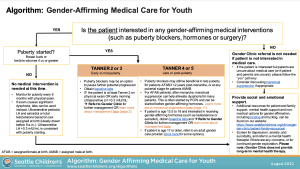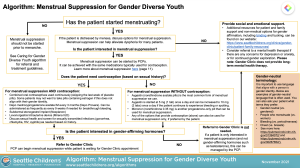Politics
Sick Documents Reveal Hospital’s Relentless Push For Gender Transitions On Kids
Seattle Children’s Hospital is under fire for its aggressive promotion of gender transitions among children, according to shocking documents that have recently come to light. The hospital’s Gender Clinic is providing healthcare professionals with resources that advocate for gender-affirming care, including protocols for hormone therapy and puberty blockers.
The clinic even goes so far as to offer surgical letters for gender-affirming surgeries. Patient-facing materials, such as guides to hormone therapy and puberty blockers, further demonstrate the hospital’s relentless push for gender transitions on vulnerable children.
A flow chart for gender-affirming medical care for youth was uncovered, which recommends medical interventions for children as young as Tanner stage 2 or 3 (early to mid-puberty) who express interest in gender-affirming interventions, including puberty blockers, hormones, or surgery.

The chart also suggests that gender clinic referrals are not necessary and that parents’ uncertainty should not prevent a child from receiving medical care. For late or post-puberty children (Tanner stage 4 or 5), the document suggests that puberty blockers may still be beneficial and that gender-affirming hormones, such as testosterone or estradiol, may be appropriate for children aged 13.5 to 16.
It also emphasizes the need for social and emotional support and provides additional resources for patients and families, including mental health support and non-medical options for gender affirmation. The documents were released in the wake of concerns about the potential harms of gender-affirming medical interventions on children.
Here’s another chart for “Menstrual Suppression for Gender Diverse Youth”

The chart shows that menstrual suppression is crucial for gender diverse youth. It states that menstrual suppression should not be started prior to menarche, and that menstrual suppression can help alleviate dysphoria for many patients which can be managed by their primary care provider.
The chart provides several options for pills including Aygestin and Micronor.
Aygestin is a synthetic form of the hormone progesterone. It is primarily used to treat irregular menstrual periods, endometriosis, and abnormal uterine bleeding. Aygestin can also be used as a contraceptive, but it is not as commonly used for this purpose.
Micronor, on the other hand, is a progestin-only birth control pill that contains norethindrone. It is often called the “mini-pill” because it does not contain estrogen like combination birth control pills. Micronor is used to prevent pregnancy by thickening the cervical mucus, which makes it more difficult for sperm to reach the egg, and thinning the lining of the uterus, which makes it less receptive to a fertilized egg.
While some medical professionals and advocates argue that these interventions are necessary for the mental health and wellbeing of gender diverse youth, many have expressed concerns about the potential long-term physical and psychological risks, as well as the impact on the child’s ability to make informed decisions about their own body.







